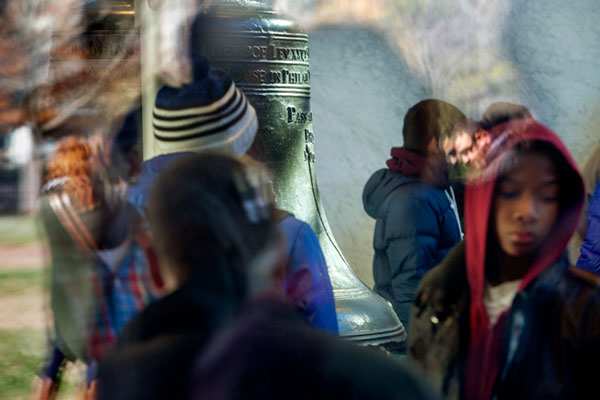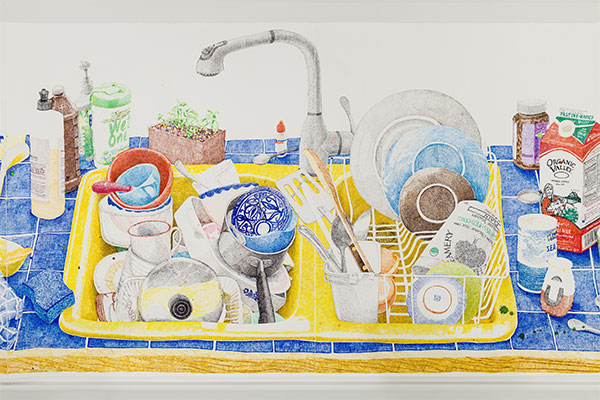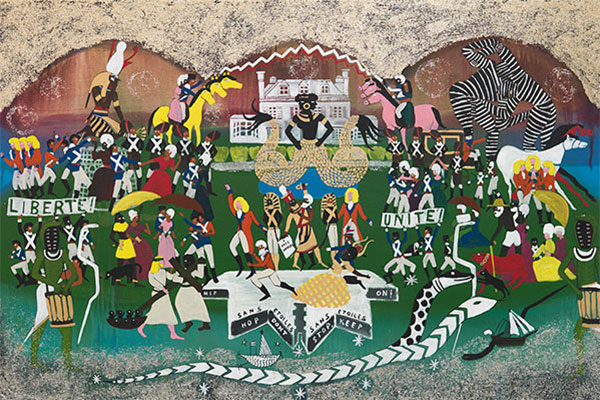2018-2019 BIG IDEA Projects
We the People: Protest and Patriotism
Sep 28–Dec 14, 2018

Eugene Richards
As citizens in a representative democracy, Americans rely on elected officials to make legislation and policy—to act in the United States’ best interests domestically and internationally. But from the time of its founding, the U.S. has also been a nation that embraces the idea of participatory democracy. Our country functions because it allows (and depends upon) the participation of its citizens. Those seeking to participate in the democratic process can take a wide range of actions, from voting in elections to running for office, showing up for city council meetings, or organizing and joining public marches and rallies. In fact, public acts of protest have shaped America’s history since the moment in December 1773 when colonists gathered in Boston Harbor to reject a shipment of tea from the East India Company in protest of their lack of representation in British Parliament. Public protests have punctuated America’s history, bringing people together to speak out against slavery or the Vietnam War, and in favor of voting rights for women, expanded protections for workers, or civil rights for African-Americans, members of the LGBTQ community and many others. Organizing publicly gives citizens with a shared set of beliefs the chance to speak with a unified voice about their vision for the country and the opportunity to effect social and political change. While marches and rallies may be among the most visible ways that Americans participate in their democracy, citizens also take quieter measures—exercising their right to vote, for example. Volunteering on a campaign. or running for office in order to be part of the process of governing, which begins at the grassroots level. American democracy has never been neat and tidy; instead, it is complicated and sometimes messy. However, democracy is enriched and ensured by its citizens’ participation, whatever form that might take. And every act of participation, whether flying a flag or voting in elections, running for office or marching in the streets, is also an act of patriotism that affirms and celebrates our shared belief that as citizens, we have the right and the duty to help shape our nation’s government.
The BIG IDEA project We the People: Protest and Patriotism is generously supported by Jeri L. Wolfson.
VISUAL ARTS EVENTS
Museum Exhibition
Sep 28–Dec 14, 2018
FREE at The Center, Ketchum
Mon-Fri, 9am-5pm
Evening Exhibition Tour and Discussion with Artists Deborah Aschheim and Paul Shambroom
Thu, Oct 11, 5:30pm
FREE at The Center, Ketchum
Evening Exhibition Tours
Thu, Nov 1 and Thu, Dec 6, 5:30pm
FREE at The Center, Ketchum
Enjoy a glass of wine as you tour the exhibition with The Center’s curators and museum guides.
Gallery Walk
Fri, Nov 23, 4–6pm
FREE at The Center, Ketchum
Start your Gallery Walk at The Center!
ASSOCIATED EVENTS
- COMPANY OF FOOLS THEATRE: Woody Guthrie’s American Song, Songs and Writings by Woody Guthrie, Conceived and Adapted by Peter Glazer, Orchestrations and Vocal Arrangements by Jeff Waxman…..Jun 26–Jul 15, 2018
- ART HISTORY LECTURE: Artists as Agitators and Changemakers with Kristin Poole, Artistic Director…..Thu, Sep 27, 5:30pm
- LECTURE: Jon Meacham “The Soul of America”…..Oct 3, 2018, 6:30pm
- ART HISTORY LECTURE: Ambrogio Lorenzetti’s Allegory of Good and Bad Government: 14th Century Ideas with Relevance Today, with Elaine French…..Oct 18, 5:30pm
- COMPANY OF FOOLS PLAY READING: The Agitators, by Mat Smart…..Oct 23, 6:30pm
- PANEL DISCUSSION: Governed by the People—Why Do We Serve?…..Nov 13, 6pm
- CONCERT: The War and Treaty…..Nov 15, 7:30pm
- FILM: The Other Side of Everything…..Nov 1, 4:30 and 7pm
- FILM: Two Trains Runnin’…..Nov 29, 4:30 and 7pm
- FAMILY DAY: It’s as American as Apple Pie!…..Nov 3, 3–5pm
![]() As part of the BIG IDEA project, We the People, the Sun Valley Center for the Arts is a 50 State Initiative partner of For Freedoms. Since 2016, For Freedoms has produced special exhibitions, town hall meetings, billboards, and lawn sign installations to spur greater participation in civic life. This year, For Freedoms launched its 50 State Initiative, a new phase of programming to encourage broad participation and inspire conversation around November’s midterm elections. Building off of the existing artistic infrastructure in the United States, For Freedoms has developed a network of more than 300 artists and 200 institutional partners who will produce nation-wide public art installations, exhibitions and local community dialogues in order to inject nuanced, artistic thinking into public discourse. Centered around the vital work of artists, For Freedoms hopes that these exhibitions and related projects will model how arts institutions can become civic forums for action and discussion of values, place, and patriotism. Learn more at: forfreedoms.org/50-state-initiative
As part of the BIG IDEA project, We the People, the Sun Valley Center for the Arts is a 50 State Initiative partner of For Freedoms. Since 2016, For Freedoms has produced special exhibitions, town hall meetings, billboards, and lawn sign installations to spur greater participation in civic life. This year, For Freedoms launched its 50 State Initiative, a new phase of programming to encourage broad participation and inspire conversation around November’s midterm elections. Building off of the existing artistic infrastructure in the United States, For Freedoms has developed a network of more than 300 artists and 200 institutional partners who will produce nation-wide public art installations, exhibitions and local community dialogues in order to inject nuanced, artistic thinking into public discourse. Centered around the vital work of artists, For Freedoms hopes that these exhibitions and related projects will model how arts institutions can become civic forums for action and discussion of values, place, and patriotism. Learn more at: forfreedoms.org/50-state-initiative
At the Table: Kitchen as Home
Dec 21, 2018–Mar 1, 2019

Joan Linder
For many of us, the kitchen plays a part in our earliest memories—memories that are multi-sensual, bringing taste and smell together with our visual recollections of the spaces in which our families gathered. We often recreate our childhood memories of the kitchen as adults, cooking from recipes our parents used, buying the same foods that lined our childhood shelves, or serving meals on dishes inherited from grandparents. The BIG IDEA project At the Table: Kitchen as Home considers the central role of the kitchen in shaping our memories, our families and our social lives. Kitchens are spaces of ritual—places for the preparation of food as well as its sharing. We come together in kitchens to cook and to eat, to share in conversation, to do homework, to plant small gardens or make art, to entertain friends and family. Kitchens can be places for culinary creativity and experimentation, but they also offer the security of repetition—the pot of coffee prepared the same way every morning or the meal thrown together by rote. A kitchen’s contents reflect its occupants’ tastes and habits: a peek into someone’s refrigerator, pantry or utensil drawer offers insights into how they live and how they nourish themselves. At their best, kitchens are places of comfort. They offer the opportunity to connect to our past through the making and sharing of food with those we care for in the present.
The BIG IDEA project At the Table: Kitchen as Home is generously supported by Ali Long.
Click here to view the Exhibition Brochure
MUSEUM EXHIBITION
Abby Carter spent several years volunteering in a soup kitchen in Connecticut. She got to know its patrons and began making portraits of the many different people for whom the soup kitchen was a vital resource. The exhibition includes a selection of her portraits, some offering views of the interior of the soup kitchen as well as its guests.
Illustrator Ferris Cook has made a series of drawings of individual kitchen objects: an espresso maker, a toaster, a spoon. Her elegant pencil drawings depict the cherished tools we turn to when preparing our food. They are paired with an installation of kitchen objects on loan from residents of the Wood River Valley.
Benny Fountain has produced a number of paintings that marry the interior of the kitchen in a house he once owned in Portland, Oregon, with views through a window to the northern Idaho landscapes of his childhood. His paintings underline the connection between kitchens and our memories of place.
Julie Green’s painting practice has long addressed themes of food and the domestic. The Center commissioned Green to spend time in residence at the Sun Valley Center for the Arts, Hailey, making work in response to the history of the house. In Hailey, Green produced several large paintings on Tyvek inspired by plates and platters she encountered in the house as well as the life of one of its most prominent occupants, Roberta McKercher. The exhibition pairs these new works with Green’s An Embarrassment of Dishes, a Noritake dinner service for 12 inherited from her grandmother that she painted and inscribed with stories from her youth.
MK Guth has produced a number of sculptures that combine books, objects and written instructions for different kinds of events that involve the preparation and sharing of food and drink. The exhibition includes two sculptures, Dinner for Remembering and Dinner to Plan a Revolution. Her works invite viewers to consider the ways that shared meals can be transformative experiences.
Following the birth of her first child, Joan Linder began making daily drawings of her kitchen sink “brimming with dishes, recently washed, or practically untouched.” The drawings capture the accumulation of plates and cups, cleaning supplies and cooking ingredients that result from meals prepared and enjoyed. They convey the passage of time in the kitchen, where labor repeats itself in a daily cycle.
Julie Green’s residency is generously sponsored by Jennifer Wilson.
VISUAL ARTS EVENTS
Museum Exhibition
Dec 21, 2018–March 1, 2019
FREE at The Center, Ketchum
Mon-Fri, 9am-5pm Sats in Feb, 11am-5pm
Evening Exhibition Tour
Thu, Jan 3, 5:30pm
FREE at The Center, Ketchum
Artist Talk: MK Guth
Wed, Jan 9, 5:30pm
FREE at The Center, Ketchum
Join artist MK Guth for an evening talk about the role of social ritual, performance, food and drink within her artistic practice.
Evening Exhibition Tour and Artist Talk with Abby Carter, with special guests from the Hunger Coalition
Thu, Jan 24, 5:30pm FREE at The Center, Ketchum
Artist Abby Carter will discuss her portraits of the guests of a Connecticut soup kitchen. Staff and participants from the Hunger Coalition will join the conversation, sharing images and stories from their Authentic Voices project. Join us for a dialogue about food insecurity in the Wood River Valley and beyond.
Evening Exhibition Tour and Artist Talk with Artist Julie Green
Thu, Feb 7, 5:30pm FREE at The Center, Ketchum
Enjoy a glass of wine as you tour the exhibition with The Center’s curators and museum guides.
Gallery Walk
Fri, Dec 28 & Feb 15, 5–7pm
FREE at The Center, Ketchum
Start your Gallery Walk at The Center!
ASSOCIATED EVENTS
- LECTURE: Cooking Shouldn’t Kill with Nancy Hughes and Taylor Rixon…..Thu, Jan 3, 6:30pm
- FILM: The Irish Pub Thu, Jan 10…..4:30 and 7pm
- FAMILY DAY: Art, drink and be merry!…..Sat, Jan 12, 3–5pm
- CREATIVE JUMP-IN: Sketching Kitchen Memories with Bob Dix…..Wed, Jan 16, 5:30–8pm
- FILM: Chef Flynn, Thu, Jan 24…..4:30 and 7pm
- PERFORMING ARTS: Winter Warm-up Veillée with Bon Débarras…..Thu, Jan 17, 7pm
- TEEN WORKSHOP: Cookie Art! with Virginia McConnell of Canuck Cookies…..Sat, Jan 26, 10am–4pm
- SPECIAL EVENT: Gather Around: Public Storytelling with Idaho Basecamp…..Thu, Jan 31, 6pm
- COMPANY OF FOOLS THEATRE: Dinners with Friends: Recipes for Storytelling A series of short reflections…..Fri, Feb 1, 7pm
- LECTURE: Joanne Weir: “Plates, Places and Stories from My Family Kitchen”…..Sat, Feb 23, 4pm
Unraveling: Reimagining Colonization in the Americas
Mar 8–May 22, 2019

Frohawk Two Feathers
The history of the colonization of the Americas has traditionally been taught as a straightforward story of European conquest of indigenous cultures and expansion across territories already settled by native peoples for millennia. What does this linear history omit? What are the possibilities for reimagining or reinterpreting colonial history from the indigenous point of view? This project revisits the colonization of the Americas, offering alternative perspectives and narratives based both in fact and in fiction, including some rooted in the Wood River Valley.


